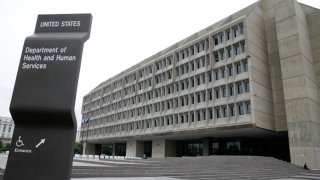
The Biden administration threatened Monday to pursue legal action if Texas Gov. Greg Abbott doesn't rescind his order shutting down federally funded shelters that house migrant children who cross the U.S.-Mexico border without their parents.
In a letter obtained by The Associated Press, the deputy general counsel for the U.S. Department of Health and Human Services told the Republican governor that even though the state issues the licenses for the shelter, Congress has tasked his agency with caring for unaccompanied children.
He warned Abbott not to interfere with those operations and said HHS intends to pursue legal action if the state proceeds to close the shelters down.
"(The Office of Refugee Resettlement) operates 52 state-licensed facilities in Texas, which comprise a significant portion of ORR's total operational footprint, and represent an indispensable component of the federal immigration system," Paul Rodriguez, HHS deputy general counsel, wrote in the letter two Abbott and two other Texas officials. The "proclamation would be a direct attack on this system."
Get top local stories in DFW delivered to you every morning. >Sign up for NBC DFW's News Headlines newsletter.
The letter urges Abbott to clarify by June 11 whether his proclamation last week applies to 52 shelters that are licensed by the state but funded with federal grants.
It argues that federal law states these migrant children "do not accrue unlawful presence" while they are in the United States, challenging Abbott's labeling of these children as "unlawful immigrants."
Texas News
News from around the state of Texas.
More than half of migrant children sheltered by the U.S. government in licensed facilities are in Texas. The last census taken on May 19 showed 4,223 children in the facilities of about 7,000 in the entire network of licensed shelters.
Experts and advocates say shutting down these shelters could seriously disrupt the program for unaccompanied children, which already faces capacity problems forcing the government to open up a dozen emergency sites to process thousands of children.
The Biden administration has worked to speed up the transfers from Border Patrol to HHS custody, and the releases of children to relatives in the U.S. In the past month, HHS has reduced the number of children in shelters or emergency sites by releasing more of them to their families.
However, as of Sunday, there are still about 16,000 children in HHS custody, and the federal government has struggled to increase the number of beds in licensed shelters, which are preferred by advocates.
The so-called emergency intake sites were opened beginning in March at convention centers, military bases and other large venues. They look like hurricane evacuation shelters, with little space to play and no privacy. Advocates and lawmakers who have visited have voiced concerns about the children's mental health.
Abbott also has been critical of emergency facilities that lack state licenses, but advocates say his directive could transfer more children to the large-scale sites.
The letter says the state would be discriminating against providers who have federal government grants to run these shelters. That would violate the doctrine of intergovernmental immunity, which impedes states interfering with federal activity, and the Supremacy Clause, which says federal law takes precedence over state or local laws.
The order to strip away licenses from shelters is part of a disaster declaration Abbott issued last week, arguing the federal government can't force Texas to keep issuing state licenses in response to a federal problem. The proclamation was a highly unusual move by the governor that comes amid criticism of record numbers of border crossings in recent months.
More recently, Abbott is saying that state troopers will soon begin arresting migrants at the border, promising an announcement later this week.
The letter sent Monday was addressed to Abbott, Texas Deputy Secretary of State Jose Esparza and Executive Commissioner of Texas Health and Human Services Cecil Erwin Young.
Click here to listen to the latest episode of the Lone Star Politics Podcast.



